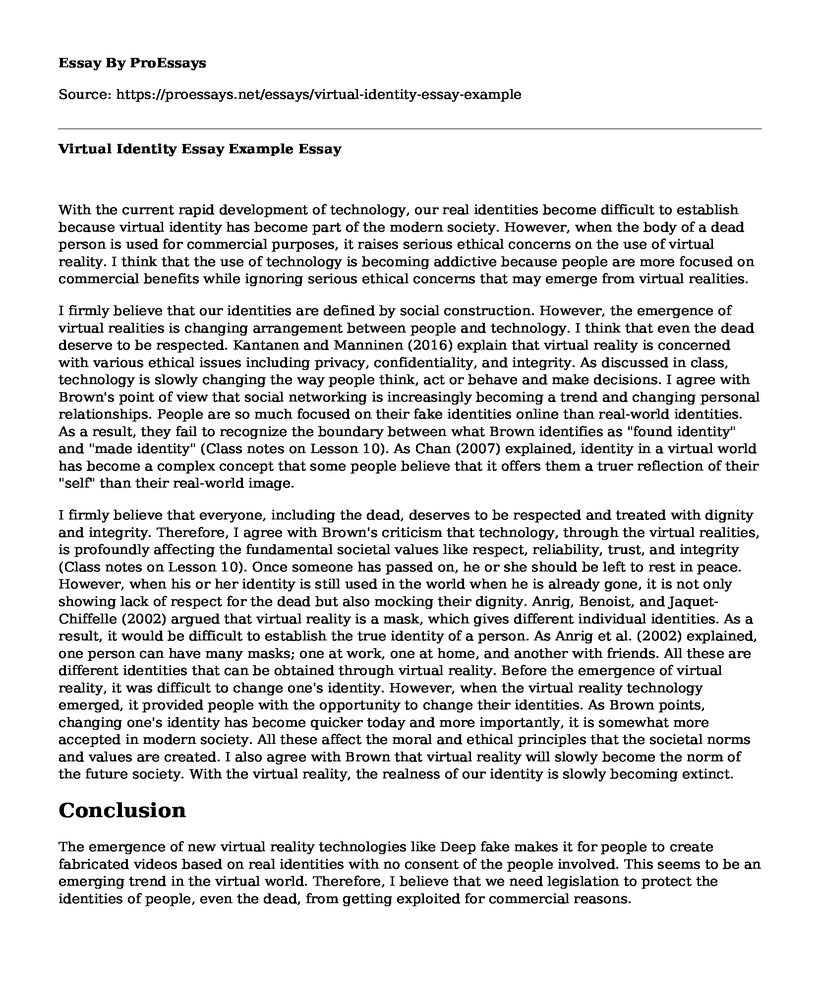With the current rapid development of technology, our real identities become difficult to establish because virtual identity has become part of the modern society. However, when the body of a dead person is used for commercial purposes, it raises serious ethical concerns on the use of virtual reality. I think that the use of technology is becoming addictive because people are more focused on commercial benefits while ignoring serious ethical concerns that may emerge from virtual realities.
I firmly believe that our identities are defined by social construction. However, the emergence of virtual realities is changing arrangement between people and technology. I think that even the dead deserve to be respected. Kantanen and Manninen (2016) explain that virtual reality is concerned with various ethical issues including privacy, confidentiality, and integrity. As discussed in class, technology is slowly changing the way people think, act or behave and make decisions. I agree with Brown's point of view that social networking is increasingly becoming a trend and changing personal relationships. People are so much focused on their fake identities online than real-world identities. As a result, they fail to recognize the boundary between what Brown identifies as "found identity" and "made identity" (Class notes on Lesson 10). As Chan (2007) explained, identity in a virtual world has become a complex concept that some people believe that it offers them a truer reflection of their "self" than their real-world image.
I firmly believe that everyone, including the dead, deserves to be respected and treated with dignity and integrity. Therefore, I agree with Brown's criticism that technology, through the virtual realities, is profoundly affecting the fundamental societal values like respect, reliability, trust, and integrity (Class notes on Lesson 10). Once someone has passed on, he or she should be left to rest in peace. However, when his or her identity is still used in the world when he is already gone, it is not only showing lack of respect for the dead but also mocking their dignity. Anrig, Benoist, and Jaquet-Chiffelle (2002) argued that virtual reality is a mask, which gives different individual identities. As a result, it would be difficult to establish the true identity of a person. As Anrig et al. (2002) explained, one person can have many masks; one at work, one at home, and another with friends. All these are different identities that can be obtained through virtual reality. Before the emergence of virtual reality, it was difficult to change one's identity. However, when the virtual reality technology emerged, it provided people with the opportunity to change their identities. As Brown points, changing one's identity has become quicker today and more importantly, it is somewhat more accepted in modern society. All these affect the moral and ethical principles that the societal norms and values are created. I also agree with Brown that virtual reality will slowly become the norm of the future society. With the virtual reality, the realness of our identity is slowly becoming extinct.
Conclusion
The emergence of new virtual reality technologies like Deep fake makes it for people to create fabricated videos based on real identities with no consent of the people involved. This seems to be an emerging trend in the virtual world. Therefore, I believe that we need legislation to protect the identities of people, even the dead, from getting exploited for commercial reasons.
References
Anrig, B., Benoist, E., & Jaquet-Chiffelle, D. O. (2002). Virtual? Identity. FIDIS Deliverable 2.2: Set of use cases and scenarios, 22-34. Retrieved from https://www.researchgate.net/publication/266418436_Virtual_Identity
Chan, J. M. (2007, June 14). Identity in a Virtual World. CNN International. Retrieved from http://edition.cnn.com/2007/TECH/06/07/virtual_identity/index.html
Kantanen, H., & Manninen, J. (2016). Hazy boundaries: Virtual communities and research ethics. Media and Communication, 4(4), 86-96. Retrieved from https://www.ssoar.info/ssoar/bitstream/handle/document/53823/ssoar-mediacomm-2016-4-kantanen_et_al-Hazy_Boundaries_Virtual_Communities_and.pdf?sequence=3
Cite this page
Virtual Identity Essay Example. (2022, Sep 22). Retrieved from https://proessays.net/essays/virtual-identity-essay-example
If you are the original author of this essay and no longer wish to have it published on the ProEssays website, please click below to request its removal:
- Happiness and the Virtues According to Aristotle
- Philosophy Essay Example: Analysis from a Utilitarian Perspective
- The Problem of Freedom and Determinism - Paper Example
- Animal Bushmeat and Ethics Essay
- Comparing Plato's Allegory of the Cave to a Real-Life Situation
- The Use of Alternative Energy Is Beneficial And Economical Essay Example
- Middle East: A Boom in Wealth Creation Due to Oil Discovery - Essay Sample







